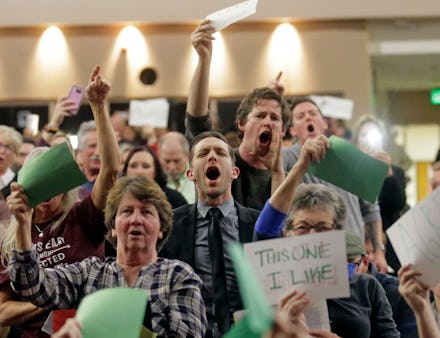Members of Congress are trying to dodge their constituents so they don't get yelled at too

As members of Congress return to their home districts for the first congressional recess of the new session, many are facing icy receptions from angry constituents with tough questions.
And while some legislators have chosen to meet directly with voters, many more are going out of their way to try and avoid any face-to-face interaction with the people they represent.
On Tuesday, Sen. Chuck Grassley (R-Iowa) faced intense criticism from more than 100 of his constituents during an Iowa Falls town hall. Attendees berated Grassley for everything from the Affordable Care Act to the Republican Party's refusal to hold a confirmation hearing for then-President Barack Obama's Supreme Court nominee.
Elsewhere in the state, Sen. Joni Ernst was faced similarly tough questions.
In Kentucky, an angry constituent of Senate Majority Leader Mitch McConnell grilled the Republican leader telling him that if he answered her questions then she would "sit down and shut up like Elizabeth Warren" — a reference to McConnell's controversial silencing of the Massachusetts senator on the Senate floor.
The rise of — and resistance to — the Indivisible movement
The constituent face-time is part of a new grassroots movement known as "Indivisible," which is putting pressure on members of Congress to respond to constituent concerns about the new administration. (The term "indivisible" comes from the "Indivisible Guide," a pamphlet put out by former staffers for Democratic members of Congress that outlines how to use some of the best practices from the conservative tea party movement.)
The push to make members of Congress answer to their constituents in person is gaining momentum. A recent Politico/Morning Consult poll found that 56% of voters wanted more in-person town halls from members of Congress.
Volunteers from across the country have compiled a list of more than 400 town halls, tele-town halls, open office hours and other public events being held by members of Congress in the coming months.
But not all legislators are taking to the new demands of their job with enthusiasm. As the Indivisible strategy continues to prove successful, members of Congress have taken measures to sidestep their own awkward encounters.
Sen. Tom Cotton (R-Ark.), for example, was scheduled to appear Wednesday at a town hall pushed for by the Arkansas-based group Ozark Indivisible. But according to local reports, Cotton has attempted to change the location of the event three times and is attempting to fill the crowd with "friendlies."
Some members of Congress are simply pulling out of previously scheduled public events and town halls after discovering that Indivisible organizers and other critics would be in attendance.
In New York, Rep. Lee Zeldin canceled a constituent event after his office discovered that members of local protest groups, including the local chapter of Indivisible, planned to attend.
In Huntsville, Alabama, Rep. Mo Brooks pulled out of a town hall event sponsored by local tea party activists after interest in the event gained steam. According to Alabama politics blog Left in Alabama, Brooks' office claimed the event was never intended to be a "public" town hall, and was only supposed to be a private address to the local tea party. However, as Left in Alabama points out, both the Facebook event posting and the Eventbrite page for the town hall described it as being free and open to the public.
The local tea party organization has since deleted the page for the event, and told a local TV station that it would postpone the meeting until Trump’s Cabinet is confirmed.
It's not just Republicans who are facing pressure from organizers on the ground. Sen. Dianne Feinstein (D-Calif.) is being trolled by constituents in San Francisco who are organizing a town hall with an "empty chair" after Feinstein declined to participate in an event organized by Indivisible East Bay.
Blocked calls and tweets
Members of Congress have also gone to new lengths to avoid contact with their constituents online and on the phone.
In Waco, Texas, Republican Rep. Bill Flores blocked a number of his constituents on Twitter, including a woman who had been named "Wacoan of the year" in 2015, and had traveled to Washington, D.C., to meet Obama alongside Flores.
After outrage erupted online, Flores' office unblocked several accounts. However, organizers with the local Indivisible chapter say many accounts remain blocked.
Sen. Ron Johnson (R-Wis.) recently came under fire when his Washington, D.C., office allegedly turned off their phones in response to a flood of constituent calls. Wisconsinites across the state began reaching out to other elected officials to convey their outrage over Johnson. That eventually led Democratic Wisconsin Rep. Gwen Moore to call out Johnson on Twitter.
"Lots of constituent calls today (& last week) on @SenRonJohnson turning off his #DC office phones," Moore wrote. "This is a disturbing/ongoing trend."
Johnson's office eventually responded by tweeting a picture of Johnson on the phone with the caption, "Hey, Wisconsin. Our team is busy taking your calls and voicemails. Don't forget, you can always reach out here."
Despite the prevailing feelings of outrage, some representatives have been able to channel their constituents' frustrations into productive meetings. Democratic Rep. Ted Deutch of Florida recently addressed a crowded town hall by condemning his GOP colleagues for avoiding their constituents.
"There are a lot of my colleagues who literally have been shutting the doors not just to the town hall meetings but to their offices," Deutch said. "To everyone I work with in the United States House of Representatives — our first obligation is to respond to the needs of the people."